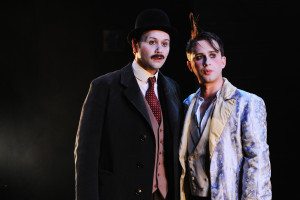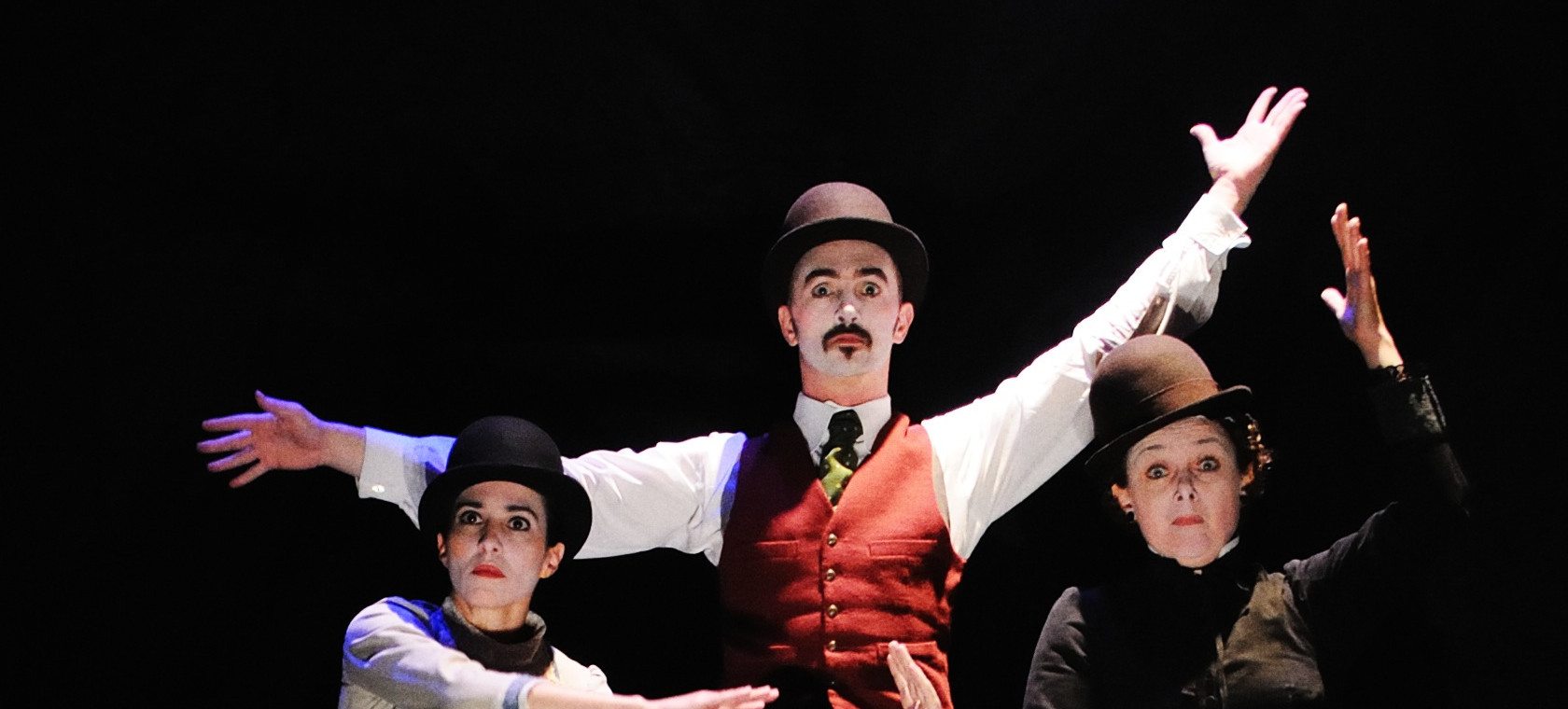The Secret Agent: Uncovered
Three Boar Arts writers tackle Theatre O’s production of The Secret Agent, at Warwick Arts Centre.
Rachel Bradley
The Secret Agent by Joseph Conrad is a weird but wonderful novel, so I was anticipating a stage adaption certainly verging on the ‘kooky’ side and I was fully prepared for something ‘alternative’ and ‘cutting edge’ (aka something a bit pretentious). Unfortunately, Theatre O’s stage adaption was less of the wonderful and a bit too much of the weird.
The plot is complex (don’t forget we are dealing with Conrad here) and director Joseph Alford was certainly brave in taking the project on. The story follows Mr Verloc, a businessman-come-spy who gets roped into a terrorist plot to blow up the Greenwich Observatory in a bid to destroy time. Throw in an autistic nephew, a murder and a suicide and you realise Theatre O really had their work cut out. Knowing the challenge they faced makes me ever so reluctant to criticise their efforts, but their artificial and heavily devised adaptation was so erratic and incoherent that it was ultimately unsuccessful.
The play begins in an extremely stylised fashion. The cast – decked out with white-faces and bowler-hats – pay homage to Brechtian satire, vaudeville and melodrama in a movement sequence that only lasts about five minutes. If you weren’t already feeling confused about the identify of the play, the set then changes into a very realistic representation of a sitting room and the audience are lurched into suppertime at the Verloc’s. Now I’m just feeling nauseous.
The ‘lurching’ doesn’t stop there. The play is split into two extremely different halves: a satirical comedy and an intimate tragedy. There is no interval, though, to psychologically signal the change and the audience is left muddled.
The scene I enjoyed the most was, in terms of the wider context of the play, probably the worst. It involved six audience members joining the cast onstage to participate in a ‘meeting’ between Verloc the spy and his spymaster. The intention was to make the story feel immediate and to draw the audience in, but in reality, it dislocated everyone involved. It seemed like a sort of interlude; a time out, which contributed very little to the development of the plot. In fact, on reflection, I think I enjoyed it so much because one audience member took his newly assigned role very seriously. His amateur dramatics were really rather amusing.
I’m not totally full of venom for this production. The cast were undoubtedly very talented and I especially enjoyed Leander Deeny’s portrayal of mentally disabled Stevie.
But despite their best efforts, their energy and originality, the performance was fractured and disorientating. I left with a headache and a lot of questions that I didn’t care enough to want answering.
Laura Primiceri
Joseph Conrad’s The Secret Agent: A Simple Tale deals with the two forces of anarchy and terrorism, both being as relevant to a contemporary audience as they were to original readers in 1907. The novel’s contemplation of destruction and exploitation, mixed in with nameless political objectives and insensible plotting, should result in a powerful and jarring production. Unfortunately, while certainly disconcerting, Theatre O’s The Secret Agent mainly consists of a chaotic conglomeration of ideas, sounds and visual impressions, resulting in most of its substance being traded in for stylistic endeavours.
This was evident in the play’s use of audience interaction, especially in a scene where six members of the audience were invited onstage to take part in a perverse tea party. This awkward group was then used in an attempt to elaborate a mostly elusive message concerning the passivity of the audience, and by extent the human population, in terms of our response to acts of terror and violence. If this was indeed the case—at this point the majority of the audience were more confused than introspective—then the point surely could have been been made in a more refined and effective way. Though the longwinded device set the stage for further audience participation, by way of thinly veiled glares and pointed looks more suited to the villain in a pantomime, it came off as disappointingly amateurish.
Despite this, it was funny. This is one of the production’s three redeeming aspects. What it sacrificed in terms of sophistication and coherence it replaced with comedy and, in its deeper moments, satire.
Its cabaret-style performance, with its white-faced, puppet-like movements and impressive light work, was visually impressive and often chilling. This, coupled with its comedic aspects, made this an entertaining performance if not an overly remarkable one.
The Secret Agent’s final successful feature was its performers. A team of five played a multitude of characters, each portrayed with whole-hearted emphatic delivery. The tragic story of siblings Winnie (Carolina Valde) and Stevie (Leander Deeny) prompted particular sympathy. The story of these two characters considered independently from the main plot itself is touching and painful; the representation of Stevie’s childish metal outlook in his circles soliloquy and Winnie’s rending distress at the death of her brother were two personal highlights.

The Secret Agent, photo: Warwick Arts Centre
Emily Dunford
Theatre O’s stylised adaption of The Secret Agent promises an entertaining evening of fast-paced drama combining elements of music hall with physical theatre in a one act play, devised by the 5 members of the cast and playwright Matthew Hurt. The cast effortlessly shifted between scenes; blurring in and out of the foreground whenever needed, with Leander Deeny deserving a mention for his moving portrayal of troubled Stevie, while doubling as the cartoon-like Vladimir, secretary of the embassy.
Indeed, a farcical meeting between Verloc (George Pott) – the secret agent – and Vladimir was a scene made memorable by its audience interaction, as audience members were selected to eat ginger biscuits onstage as Verloc used dolls to enact moments of terror. Though amusing, the bizarre comedy of this scene, which I was among those chosen for, detracted from the narrative as a whole and failed to illustrate the intended point that ‘madness alone is truly terrifying.’
To the production’s detriment, amidst its eccentricities and vaudeville, the horror of the story was lost.
That is not to say that there were not moments that impressed. In the role of Winnie Verloc, Carolina Valde’s heart-breaking ‘ballet’ in which her hands systematically sprung back to her face to avoid Verloc’s gaze was beautifully tragic.
The Secret Agent seems unfinished; elements of the plot are left unexplained and the tone never quite settles. While there’s some evidence of the tense irony that characterises Conrad’s novel, it doesn’t fully emerge in the play. Faults and all though it is an enjoyable production, relevant today for its themes of counter terrorism and surveillance.

Comments (1)